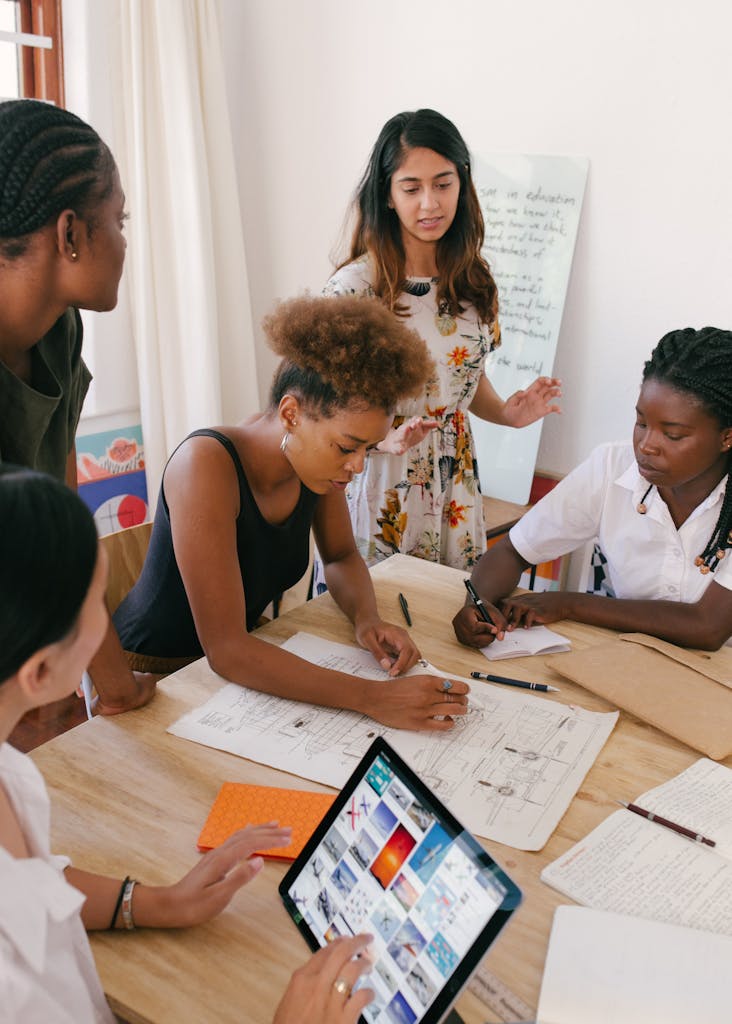Soft skills—intangible qualities like communication, teamwork, and emotional intelligence—have emerged as equally crucial as technical skills. These are the skills that enable us to navigate the complexities of interpersonal interactions, build strong relationships, and adapt to changing environments.
As businesses evolve, so does the realization that employees with robust soft skills are often better at problem-solving, collaboration, and innovation.

The Role of Workshops
Workshops play a pivotal role in honing these essential soft skills.
Unlike traditional classroom settings, workshops offer hands-on experiences. They provide a platform where individuals can practice, make mistakes, and learn in a real-time environment.
By engaging in role-plays, group discussions, and interactive activities, participants can internalize these skills more effectively.
Workshops act as a bridge, turning theoretical knowledge about soft skills into actionable habits and behaviors.
Ways to Run A Soft Skills Workshop
As we delve into the ten ways to run a successful soft skills workshop, remember that the goal is not just to teach but to transform.
Let’s embark on this journey of empowering individuals and organizations to thrive in the modern workspace.
Set Clear Objectives
Every journey begins with a destination in mind, and a soft skills workshop is no exception.
Before diving into the content or planning activities, identify what you want the participants to learn and achieve by the end of the session. This clarity will act as a guiding beacon, illuminating the path for both the facilitator and attendees.
Having well-defined objectives offers multiple benefits. Firstly, it provides direction, ensuring that every activity or discussion ties back to a core purpose. It keeps the workshop on track, preventing unnecessary diversions. Furthermore, clear objectives act as a benchmark, allowing facilitators to gauge the workshop’s effectiveness and success later on.
Maria, a diligent manager, faced a persistent challenge.
Her team, composed of talented individuals, struggled to work cohesively. Recognizing the need for better communication and teamwork, she decided to conduct a soft skills workshop. However, instead of jumping straight into activities, Maria began by setting distinct objectives. She wanted her team to understand the essence of effective communication, the importance of empathy in teamwork, and practical strategies to enhance collaboration.
With these objectives in mind, every activity and discussion during the workshop had a clear purpose. By the end, not only did her team have a newfound appreciation for each other’s roles, but they also acquired actionable tools and strategies to improve their collaboration.
When setting objectives for your workshop, aim for precision and relevance. A good rule of thumb is to define 3-5 main objectives. To ensure they’re actionable and attainable, frame them using the SMART criteria: Specific, Measurable, Achievable, Relevant, and Time-bound.
Your workshop’s success starts with a clear vision. Don’t leave it to chance. Start your workshop right. Define your objectives now!
Engage with Interactive Activities
Traditional lectures and passive learning methods have their places, but when it comes to developing soft skills, interaction is king.
Engaging attendees through interactive activities such as games, role-plays, group projects, and simulations helps in breaking the ice and ensuring that learning isn’t just theoretical but practical.
Interactive activities tap into experiential learning, where participants learn by doing. Such activities promote active participation, allowing attendees to practice new skills in a controlled environment.
They can make mistakes, get feedback, and rectify them in real time, leading to better retention and application of knowledge.
Carlos, a young trainer based in Mandaluyong, was gearing up to conduct a workshop on conflict resolution.
In the past, he had depended heavily on PowerPoint slides and lectures. However, this time, he decided to shake things up.
He introduced role-playing scenarios where participants had to act out potential workplace conflicts and then resolve them. The room buzzed with energy as attendees engaged in spirited discussions, and debates, and enacted various roles.
By the end of the workshop, participants not only grasped the theoretical aspects of conflict resolution but also practiced and honed their skills in multiple simulated scenarios, feeling better equipped to handle real-world conflicts.
Diversify the interactive activities to cater to different learning styles. While some participants may benefit from group discussions, others might find value in role-playing or visual exercises. Be flexible and observant, adjusting your methods based on the group’s dynamics and feedback.
Transform passive listeners into active participants! Elevate your workshop with engaging, interactive activities and witness the magic of experiential learning.
Provide Constructive Feedback
Soft skills development is a journey of self-awareness and continuous improvement. To foster this growth, feedback is indispensable.
Constructive feedback goes beyond mere criticism—it offers insights into what’s working, what isn’t, and suggests pathways for enhancement.
Feedback acts as a mirror, reflecting both strengths and areas needing improvement. When delivered correctly, it reinforces positive behaviors, corrects misconceptions, and encourages participants to push their boundaries.
Knowing where they stand allows attendees to target their efforts more effectively and grow in the right direction.
Rina, a seasoned HR professional, organized a workshop on effective communication.
Throughout the workshop, participants practiced various communication techniques, from active listening to persuasive speaking.
Rather than leaving them in the dark about their performance, Rina took the time to offer individual feedback. She highlighted their strengths, like excellent non-verbal cues or concise messaging, and gently pointed out areas to work on, such as reducing filler words or being more empathetic in responses.
This tailored feedback made all the difference. Attendees left not just with theoretical knowledge but with a clear roadmap of where to focus their efforts for further refinement.
When offering feedback, consider the “sandwich” method: Start with something positive, followed by areas for improvement, and conclude on another positive note. This structure ensures that participants feel valued while still acknowledging areas for growth.
Boost your workshop’s impact manifold! Empower your participants with tailored, constructive feedback, and watch them flourish in their soft skills journey.
Incorporate Real-world Scenarios
One of the most effective ways to anchor soft skills learning is to relate it to real-world situations.
By integrating scenarios that mirror actual workplace challenges or interpersonal dynamics, you make the workshop content more relatable, actionable, and memorable for participants.
Real-world scenarios make abstract concepts concrete. They provide context, which aids comprehension and retention.
Furthermore, practicing in situations that mirror real-life challenges prepares participants for genuine workplace scenarios, enhancing their confidence and competence.
Andres, a leadership coach in Pasay, was tasked with training a group of middle managers on negotiation skills.
Instead of sticking to generic exercises, he crafted scenarios based on actual negotiations these managers had encountered or would likely face in their roles. The exercises included vendor negotiations, team conflict resolutions, and stakeholder engagement.
As participants navigated these scenarios, they could directly relate their learning to their jobs, making the exercises not just informative but incredibly relevant.
By the end of the workshop, participants felt they had not only learned negotiation techniques but had also been equipped to handle real-life situations at work.
To effectively incorporate real-world scenarios, engage in pre-workshop research. Speak to a few participants or stakeholders to understand common challenges they face, then design your workshop activities around these insights.
Make your workshop unforgettable! Root your training in real-world scenarios, ensuring participants don’t just learn, but they also apply and remember.
Encourage Peer Learning
Peer learning, often overlooked, is a potent tool in soft skills development. It involves participants learning from one another’s experiences, insights, and feedback. This collaborative approach fosters a sense of community and offers diverse perspectives, enriching the overall learning experience.
Everyone brings a unique set of experiences and knowledge to the table.
By facilitating peer-to-peer interactions, participants can gain insights they might not have encountered in solo or instructor-led settings.
Peer learning also builds a culture of openness, mutual respect, and shared responsibility for growth.
Jasmine, an organizational development specialist in Ortigas, was rolling out a workshop on cross-functional collaboration.
Recognizing the diverse backgrounds of participants, she introduced breakout sessions where small groups discussed challenges and shared strategies they had used in their respective departments.
These discussions unearthed a treasure trove of insights, with participants learning novel approaches and best practices from their peers.
Post-workshop feedback highlighted these sessions as a standout feature, with attendees valuing the real-world tips and tricks they gathered from their colleagues.
To facilitate effective peer learning, create a safe and inclusive environment where participants feel comfortable sharing and listening. Using tools like breakout rooms in virtual settings or small group discussions in physical settings can help foster these interactions.
Unlock the collective wisdom of your workshop participants! Embrace peer learning and watch as your attendees learn, grow, and innovate together.
Utilize Multi-media Resources
In the digital age, learning isn’t confined to just textbooks or verbal instructions. Integrating various multimedia resources like videos, podcasts, infographics, and interactive quizzes can enrich the workshop experience, catering to different learning preferences and keeping engagement levels high.
Multimedia resources can simplify complex concepts, making them easier to understand. They also cater to various learning styles – auditory, visual, kinesthetic – ensuring a holistic learning experience for all participants. Diverse media keeps the content fresh and participants intrigued, preventing monotony.
Leo, a corporate trainer in Alabang, was preparing a workshop on emotional intelligence.
Aware of the vast resources available online, he incorporated TED talks, animated videos explaining neurological aspects, and even had an interactive online quiz to gauge participants’ emotional intelligence levels.
These varied resources not only made the workshop more engaging but also drove home the concepts in multiple formats, ensuring better retention.
Attendees especially appreciated the blend of theoretical and practical insights, thanks to the rich multimedia content.
While multimedia is valuable, ensure it complements the workshop’s objectives and doesn’t overshadow the core content. Always test tech resources beforehand to avoid glitches during the session.
Diversify your workshop’s content palette! Harness the power of multimedia resources and create a vibrant, multi-dimensional learning experience for your participants.
Foster a Safe and Inclusive Environment
For genuine learning to occur, especially in soft skills, participants must feel safe to express themselves, ask questions, make mistakes, and share experiences. Creating an environment that is free from judgment, bias, and where diversity is celebrated, lays the foundation for open communication and authentic learning.
When individuals feel valued and respected, they’re more likely to engage, participate, and take risks. An inclusive environment also ensures that diverse voices are heard, leading to richer discussions and a broader spectrum of ideas and experiences.
Liza, a leadership coach in Makati, was known for her impactful workshops. Her secret? She always started her sessions by setting ground rules.
These rules, co-created with participants, emphasized respect, active listening, and maintaining confidentiality. Liza’s approach ensured that everyone, regardless of their background or position, felt safe to voice their opinions and share their experiences.
In one memorable workshop on workplace ethics, a junior employee shared a personal experience that led to a profound discussion on organizational culture, leaving a lasting impression on all attendees.
Begin your workshop by collaboratively setting ground rules. Reinforce them throughout, and consider using icebreakers or team-building exercises to build trust among participants.
Unlock the full potential of your attendees! Cultivate a safe and inclusive workshop environment and witness the transformative power of open and honest discussions.
Keep the Energy Levels High
Engagement isn’t just about content; it’s also about the energy in the room.
Long workshops can often lead to dwindling attention spans and fatigue. Incorporating breaks, energizing activities, or even simple stretches can reinvigorate participants and maintain a lively workshop atmosphere.
Physical movement boosts circulation, aiding cognitive functions. Short, energizing activities act as a reset button, helping attendees refocus and engage better with the content. It breaks the monotony and can increase retention and participation.
In a high-rise building in Manila, Paolo, a renowned soft skills trainer, was in the midst of a day-long workshop.
Every 90 minutes, he introduced a quick 5-minute activity, be it a fun quiz, a short stretch, or even a light-hearted joke session. Attendees initially found it unusual, but as the day progressed, they realized its impact. These energizers kept them alert and active, preventing the post-lunch slump many dread.
The workshop ended on a high note, with participants lauding Paolo’s approach, noting they’d never felt more alert in a full-day session.
Monitor the energy of the room. If you notice attention waning, don’t hesitate to throw in an unplanned energizer. It’s all about being flexible and attuned to the participants’ needs.
Keep the momentum going! Integrate energy boosters in your workshop and ensure your participants remain engaged, alert, and ready to learn.
Continuously Adapt and Evolve Content
The world of soft skills is dynamic, with evolving theories, practices, and societal norms. To remain relevant and impactful, workshop content should be regularly reviewed, updated, and adjusted based on feedback and the latest industry insights.
Content that evolves over time remains fresh, relevant, and in tune with current workplace challenges. By integrating the latest research, case studies, and techniques, you ensure that your workshop delivers value and stays ahead of the curve.
Rebecca, a communication specialist in Pasig, had been running a successful workshop on intercultural communication for years.
But with the increasing globalization and shifts in workplace dynamics, she realized the need to update her content. She introduced new modules addressing virtual communication, the impact of digital cultures, and nuances of hybrid working environments.
This revamp was welcomed with enthusiasm by her attendees, who found the new content incredibly pertinent to their contemporary challenges.
Post-workshop feedback is gold. Encourage participants to share their insights, and periodically review other renowned workshops or industry publications to infuse fresh perspectives into your content.
Stay ahead in the soft skills game! Regularly refresh and evolve your workshop content, ensuring it’s always timely, impactful, and aligned with today’s challenges.
Encourage Post-Workshop Reflection and Action Plans
The end of the workshop shouldn’t mean the end of the learning journey. Encouraging participants to reflect on their learnings and create actionable plans helps in translating theoretical knowledge into real-world applications.
Reflection allows participants to internalize their learnings, recognize patterns, and see areas of application in their daily lives.
Action plans, on the other hand, provide a clear roadmap for applying these learnings, ensuring that the workshop has a lasting impact beyond the session itself.
Sofia, an expert in leadership development, was wrapping up her workshop.
Instead of a traditional Q&A, she handed out reflection worksheets and tasked attendees with noting down their key takeaways and creating a 30-day action plan.
This approach was met with surprise, but as participants delved into the task, they found immense value in it. Many came back to Sofia weeks later, sharing success stories of how they had implemented their plans and witnessed tangible improvements in their leadership skills.
Provide participants with a simple template to guide their reflection and action plan creation. This can include prompts like “One thing I learned…”, “A situation where I can apply this is…”, and “Steps I will take in the next 30 days are…”.
Turn your workshop insights into real-world achievements! Dedicate time for reflection and action planning, and watch as your participants transform their learnings into tangible results.
Maximizing the Power of Soft Skills Workshops
Soft skills, often termed the “human side” of professional development, play an undeniable role in shaping effective, empathetic, and adaptable leaders and teams.
Workshops dedicated to these skills aren’t just about disseminating information; they’re about instilling habits, changing mindsets, and fostering a culture of continuous learning.
As we’ve explored these ten ways to run a successful soft skills workshop, one thing becomes clear: success hinges on intentionality. From setting clear objectives and engaging through interactive activities to ensuring post-workshop reflection, every step needs purpose and alignment with the overarching goal.
These workshops can be a beacon of growth, bridging the gap between where they are and where they aspire to be.
As facilitators, our task is to light the way, ensuring that every participant walks away not just with knowledge, but with a blueprint for action, evolution, and excellence.
So, whether you’re a seasoned workshop facilitator or someone just starting out, remember this – every soft skills workshop holds the power to transform. Approach it with passion, preparation, and a genuine desire to impact, and you’ll unlock a world of possibilities for your participants.
Empower, engage, and elevate. Dive into the realm of soft skills workshops and be the catalyst for growth and transformation in your organization. Your journey begins now.
If you’re building a business and you are playing to win…
Let’s install one shift that moves metrics.
→ Shift Experiences


